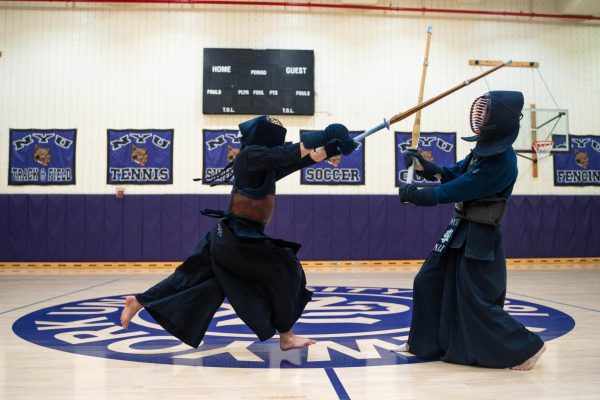CAS junior Danny Chung is the president and captain of NYU’s Kendo Club, and has been practicing the sport for over nine years. As captain, he has taken the university’s team from relatively unknown in the Kendo world to a consistent finalist in competition.
Kendo is, as described by Chung, Japanese sword fighting condensed into a sport. Unlike fencing, which is on a strip, Kendo uses a larger, square space, meaning players can charge at each other from all angles. The martial art also focuses on larger swings and movements than fencing, accentuated by the use of bamboo as opposed to metal swords.

This interview has been edited for length and clarity.
WSN: For those not familiar with Kendo, how would you define the sport?
Chung: The most simple way that people put it is Kendo is like Japanese fencing. I like to stray away from the definition because it’s pretty unique in itself and its own sport. In fencing, you’re kind of limited to forward and back. In Kendo, you have this whole court to use. I like to explain it as a sport that involves Japanese sword fighting kind of condensed into a sport form.
Chung joined the Kendo team during his sophomore year at NYU. Before that, he had been a competitor in dojos, which he said have a distinct hierarchy based on both skill and age. Learning to teach rather than fight was a new experience for Chung, but one he said he welcomed.
WSN: How would you describe the shift from being a student to being a teacher?
Chung: I don’t feel as energetic or as fast as I used to. However, in exchange, I feel like I’ve learned something different. It’s like I exchanged my super-competitive nature and all that kind of physical prowess for more on how to be a good leader. I can only define it as someone that you don’t only look up to, but somebody that can help you and somebody that can comfort you, especially when things don’t go your way.
After his first tournament at Cornell University, Chung and his friends set their sights on making it into NYU Kendo’s strongest group of competitors, its A-team. At one tournament, Chung and the rest of the A-team made it to the semifinals, but ultimately lost to Boston University’s team. Chung said that despite the tournament’s end results, the team had overcome many challenges to get that far.
WSN: How is practicing Kendo in college different from your experience training in a dojo?
Chung: The main thing that I realized practicing in dojos is that you just do what you were told. During my second year, my sensei was very adamant and very helpful. However, it was clear that he was more focused on the new beginner members, and he trusted the experienced members to watch out for each other and figure it out ourselves.
Chung, who is graduating in 2025, said he is hopeful the team will continue to improve after he has moved on from NYU.
WSN: How would you describe the community at NYU Kendo?
Chung: It’s like a German engine. When you take a look at a German car motor, it’s really complex. So it’s a mess, but it’s an organized mess, by no means are we perfect and by no means is everyone going to agree on everything. I find it helpful that even after a lot of our members graduate this year, and even when I’m gone next year, there’s going to be something left over and they’re going to be able to pass that down and make this club even better than when I found it.
Contact Sebastián Prats at [email protected].






















































































































































